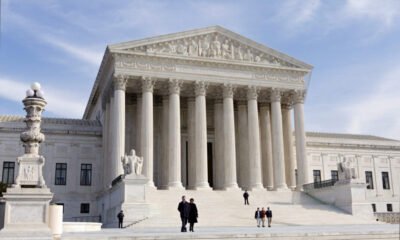Business
Kroger and Albertsons Set for Court Showdown with Skeptical US Government Over Merger Plans

The anticipated federal court hearing over the proposed merger of supermarket giants Kroger and Albertsons kicks off Monday in Portland, Oregon. This merger, valued at $24.6 billion, is positioned as the largest grocery store merger in U.S. history. Kroger argues that the union will enhance competition against major retailers like Costco and Walmart. However, the Federal Trade Commission (FTC) contends that merging the two chains would diminish competition and result in higher grocery prices amid ongoing inflation.
Both parties will present their cases, focusing on whether the court should grant the FTC’s request for a preliminary injunction to halt the merger. If approved, this injunction would enable a thorough review of the proposed deal by the FTC’s administrative law judge. Kroger operates 2,800 stores across 35 states, while Albertsons manages 2,273 stores in 34 states, collectively employing around 710,000 individuals.
Kroger and Albertsons disclosed their merger intentions in October 2022, claiming it will benefit consumers by leveraging combined negotiating power with suppliers. They assert that this collaboration could yield cost savings and strengthen their store brands, enabling them to better compete against Walmart, which claims approximately 22% of U.S. grocery sales. The merged company would control about 13% of the market.
On the contrary, the FTC argues that this merger would harm consumers. It fears elevated prices, reduced quality, and potential wage cuts for employees. In February, the FTC initiated a complaint to block the merger and subsequently filed a lawsuit in Oregon federal court, joined by attorneys general from several states including Arizona and California.
Concerns also arise regarding store closures. However, both Kroger and Albertsons maintain that if the merger proceeds, they would divest 579 overlapping locations. C&S Wholesale Grocers is set to acquire these stores, aiming to enhance competition in affected areas. Initially, the companies planned to sell 413 stores, but increased divestment was necessary due to FTC feedback.
Experts suggest that the outcome hinges on the judge’s ruling. If the FTC’s request is granted, Kroger and Albertsons might appeal, which could extend the legal battle significantly. In a separate move, Kroger has filed a lawsuit against the FTC, challenging the constitutionality of the agency’s internal processes.
If the court favors Kroger and Albertsons, the FTC is likely to appeal the decision, although appeals are rarely successful in overturning merger approvals. Meanwhile, Colorado and Washington have filed their own lawsuits seeking to block the merger, reflecting the significant local stakes involved. If successful at the federal level, it remains uncertain whether state courts could impede the merger.
As the legal proceedings unfold, the implications of this merger extend far beyond the grocery aisles, touching on competition policy and regulatory scrutiny under the current administration.
Copyright 2024 The Associated Press. All rights reserved. This material may not be published, broadcast, rewritten, or redistributed without permission.


















